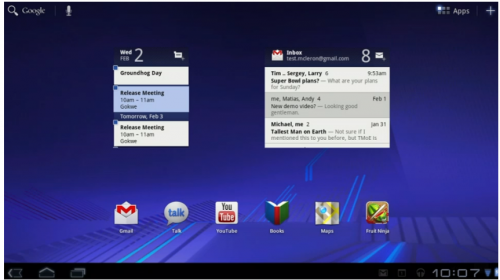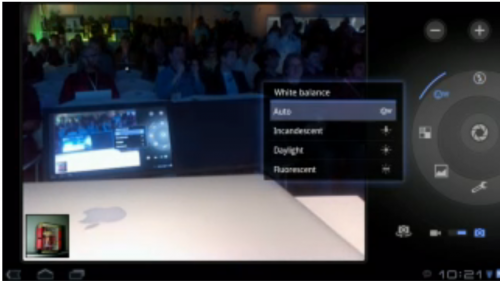Honeycomb Puts Android 3.0 Tablets On Nearly Equal Footing With iPad
This morning Google showcased the features of its new tablet-optimized version of Android: Honeycomb. Danny live-blogged the press event, Honeycomb represents a dramatic improvement over Gingerbread for tablets in several respects. The UI is the most obvious example, as well as developer tools on the back end. There are some distinct UI differences between Android […]
This morning Google showcased the features of its new tablet-optimized version of Android: Honeycomb. Danny live-blogged the press event,

Honeycomb represents a dramatic improvement over Gingerbread for tablets in several respects. The UI is the most obvious example, as well as developer tools on the back end.
There are some distinct UI differences between Android and the iPad. While Android apps and handset UIs often closely resemble the iPhone that is not true with Honeycomb for tablets. Regardless the presence of the iPad hung over the press event (at least for me) and much of what Google introduced was “catch up” or “me too” functionality.
Long overdue, Google announced a web-based version of the Android Market. It also gave developers new ways to promote their apps on the applications page and virally through social media.
Android developers have complained that people aren’t buying apps and thus they’re not making enough money on the platform. This is partly due to payment friction and the lack of a unified payments platform across countries. Google and carriers have tried to remedy this by adding carrier billing as an option in addition to Google Checkout.
Today Google demo’d a relatively smooth app purchase process. It also introduced in-app purchases, which will help mollify developers and make them more money — especially game developers.
Google also briefly teased Google Music but didn’t discuss it or provide release date. One area of clear superiority for Android is Google Maps. The version of Maps for Honeycomb is much richer than the comparable version of Maps for the iPad.
Here are some additional screens:
Google said that existing Android applications will work without modification and run “really well” on Android (unlike iPhone apps on the iPad). Google says that it still wants to encourage developers to build “tablet optimized” applications. Lots of developer-speak and discussion of developer tools within the Honeycomb framework ensued to general confusion (on my part).
Android tablets will feature cameras with the ability to shoot a video and upload it instantly to YouTube. Cameras are not part of the iPad but thought to be part of iPad 2 coming out later this year.
Honeycomb supports video chat:
Third party apps were displayed and demonstrated:
Google says that developers will now have lots of control over application pages and app promotion within the Android webstore (including with YouTube video). There are social-promotional tools (tweet about apps directly from the webstore). The new webstore is a cloud-based version of iTunes with no wired syncing.
Overall Honeycomb will make Android tablets much more competitive with the iPad than existing Android devices (e.g., Galaxy Tab) running earlier versions of the Android software. Pricing will be critical to their adoption however. In addition the availability of smaller 7″ tablets may prove a very successful form factor for Android.
Apple has largely shunned the idea of producing smaller tablet (“nano”) devices. But the Samsung Galaxy Tab’s relative success shows a demand for the smaller sized, more “mobile” tablet — especially given the inferiority of the overall Galaxy Tab experience.
Expect Android tablet adoption to generally follow the path of Android handset adoption with a somewhat less aggressive growth curve because the iPad is broadly available unlike its sibling the iPhone. What will also be interesting to see is how other tablets fare when they’re introduced later in the year (WebOS, RIM Playbook).
Contributing authors are invited to create content for Search Engine Land and are chosen for their expertise and contribution to the search community. Our contributors work under the oversight of the editorial staff and contributions are checked for quality and relevance to our readers. The opinions they express are their own.
Related stories
New on Search Engine Land






